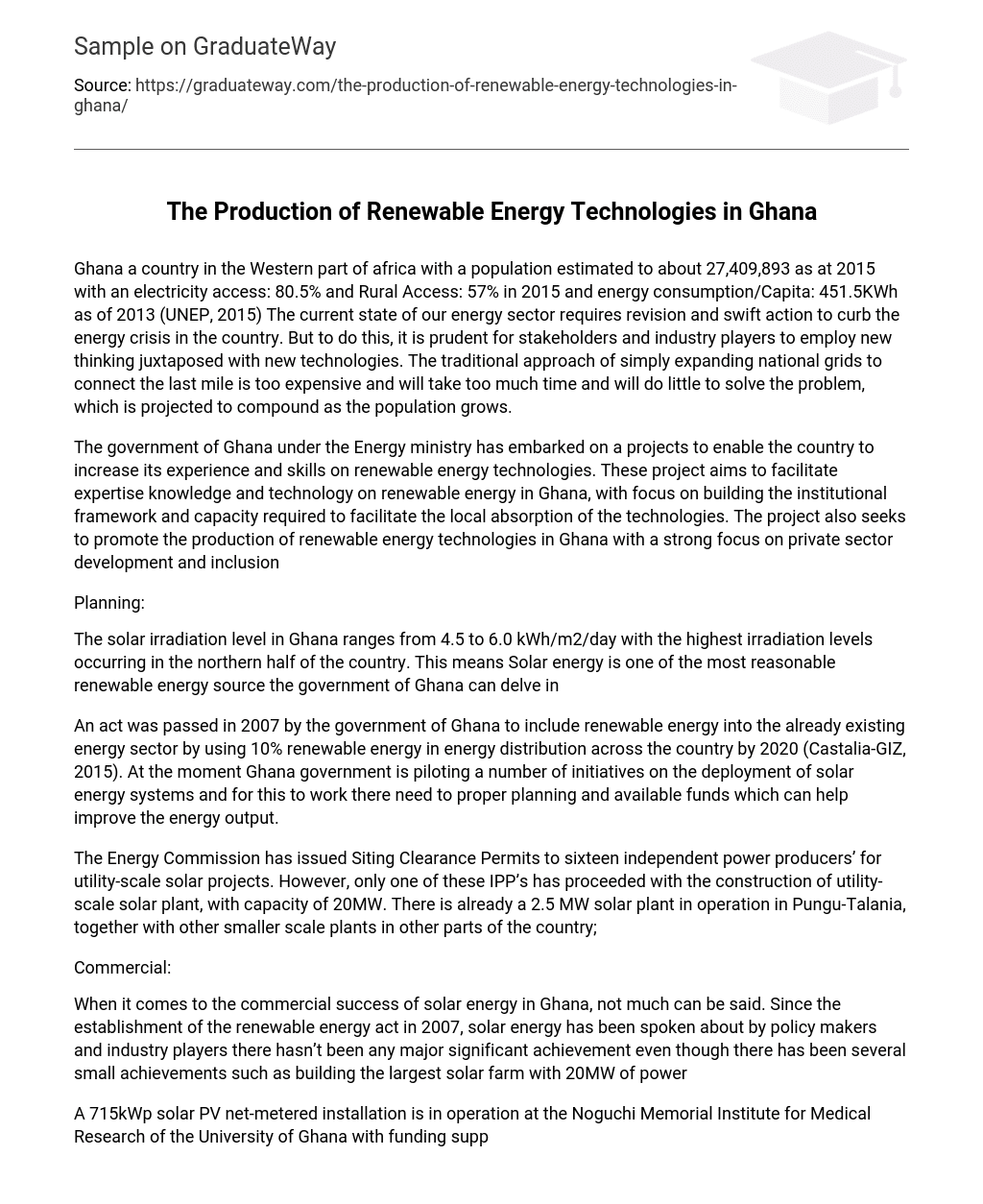Ghana a country in the Western part of africa with a population estimated to about 27,409,893 as at 2015 with an electricity access: 80.5% and Rural Access: 57% in 2015 and energy consumption/Capita: 451.5KWh as of 2013 (UNEP, 2015) The current state of our energy sector requires revision and swift action to curb the energy crisis in the country. But to do this, it is prudent for stakeholders and industry players to employ new thinking juxtaposed with new technologies. The traditional approach of simply expanding national grids to connect the last mile is too expensive and will take too much time and will do little to solve the problem, which is projected to compound as the population grows.
The government of Ghana under the Energy ministry has embarked on a projects to enable the country to increase its experience and skills on renewable energy technologies. These project aims to facilitate expertise knowledge and technology on renewable energy in Ghana, with focus on building the institutional framework and capacity required to facilitate the local absorption of the technologies. The project also seeks to promote the production of renewable energy technologies in Ghana with a strong focus on private sector development and inclusion
Planning:
The solar irradiation level in Ghana ranges from 4.5 to 6.0 kWh/m2/day with the highest irradiation levels occurring in the northern half of the country. This means Solar energy is one of the most reasonable renewable energy source the government of Ghana can delve in
An act was passed in 2007 by the government of Ghana to include renewable energy into the already existing energy sector by using 10% renewable energy in energy distribution across the country by 2020 (Castalia-GIZ, 2015). At the moment Ghana government is piloting a number of initiatives on the deployment of solar energy systems and for this to work there need to proper planning and available funds which can help improve the energy output.
The Energy Commission has issued Siting Clearance Permits to sixteen independent power producers’ for utility-scale solar projects. However, only one of these IPP’s has proceeded with the construction of utility-scale solar plant, with capacity of 20MW. There is already a 2.5 MW solar plant in operation in Pungu-Talania, together with other smaller scale plants in other parts of the country;
Commercial:
When it comes to the commercial success of solar energy in Ghana, not much can be said. Since the establishment of the renewable energy act in 2007, solar energy has been spoken about by policy makers and industry players there hasn’t been any major significant achievement even though there has been several small achievements such as building the largest solar farm with 20MW of power
A 715kWp solar PV net-metered installation is in operation at the Noguchi Memorial Institute for Medical Research of the University of Ghana with funding support from the Japanese Government. This is giving way for solar power to be used by individuals in their homes and work places including industries. According an interview done by GhanaWeb, the CEO of Sunpower Innovations gave the names of several business in the country who are using the solar energy system either fully or to support their already acquired energy source; some are Aqua Safari Resort, Alisa Swiss Spirit Hotel, Total Ghana LTD, CalBank LTD, Special Ice LTD and Local Government Secretariat Service
Through a joint effort between the Ghana government and private agencies an additional 25 grid-tied solar PV systems were installed at the end of 2014 through initiatives from both parties bringing total national capacity to 8 MW;
The ministry of energy has started an annual fair called The Ghana Renewable Energy Fair which started in 2015 as one of the key publicity initiatives to make the renewable energy industry visible, to promote the rapid utilization of renewable energy resources in the country and a net metering code has been developed with technical assistance from the German Government making users know how much power they are using in connection with the cost involved. This meant 200,000 Solar Roof Top programme being implemented by the Energy Commission and the Government providing capital subsidy of 500W panel per installation.
Financial:
In the past decade, Ghana has experienced severe electricity supply challenges costing the nation an average of US $2.1 million in loss of production daily. This situation has developed even though installed generation capacity has more than doubled over the period; increasing from 1,730 MW in 2006 to 3,795 MW in 2016. The peak electricity demand only increased by 50 percent during this same period, increasing from 1,393 MW in 2006 to 2,087 MW in 2016. Due to this demand there has been a lot of solar energy companies springing up, at the moment there are more than 100 solar energy companies in Ghana. According to the energy commission’s 2018 energy outlook for Ghana there has been massive demand for solar energy which has in turn increase income in the sector.
A typical Solar home systems is initially expensive to set up but after setup as compared to other sources of energy it’s cheaper to use and maintain. A research by Tiwaa in 2015 on Solar Home System found out that. The above summary of cost acquisition of the Solar Home System were used for the economic analysis of the study. Unit prices of all items presented in Table 2.2 are retail prices obtained from Solar Utilization Company Limited based in Nkoranza North District of the Brong Ahafo region. The cost of acquiring the proposed SHS is therefore the sum of all total prices of all components.





